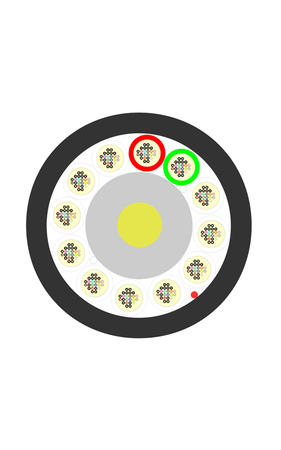Product Details
KDP
K1FZ372288ERAX
TP024187
A-DQ4Y 288E9/G.657.A1 200 ORG
New
Similar Products
Product Description
The 288FO (12x24) Air Blown Fiber Microduct Loose Tube Fiber Optic Cable SM G.657.A1 Orange (Part number: K1FZ372288ERAX) from KDP with 288FO. Air blown microduct fiber cable is optimised for injection into microducts and is used in optical networks, more specifically for use in Fiber-to-the-home (FTTH) and Fiber-to-the-Desk (FTTD) networks. This technique that is lower at cost, quicker and more environmentally friendly than traditional deployment, allowing a simpler instalation with less resources.
The 288FO (12x24) Air Blown Fiber Microduct Loose Tube Fiber Optic Cable SM G.657.A1 Orange from KDP is a Microduct Blowable Fiber cable with 288 fibers within 12 loose tubes. This distribution microcable for optical networks has a high fiber count and a reduce loose tube diameter (200µm), allowing a considerable small cable diameter for a 288FO cable. It has a polyethyelene FRP dielectric central strength member and a UV stable polyethyelene outer sheath with a ripcord underneath it, for mechanical reinforcement and waterblocking yarns to prevent the progression of water inside the cable. The optical fibers comply with ITU-T recommendations G.652.D.
Applications
For outdoor use; Installation by blowing in microducts; FTTx
Characteristics
- Optical fiber
- Singlemode
- Loose tube
- Waterproof
- UV rays resistant
- Ripcord
- High fiber count/Low loose tube diameter
- Exterior Diameter of cable 9,6 mm ± 0,4 mm
- Weight 88 Kg/km
*For technical specifications please see attached datasheet.
Product Specifications
Fiber Type (ITU) - OS2 G.657.A1
Each type of single-mode fiber has its own area of application, and the evolution of these optical fiber specifications reflects the evolution of transmission system technology from the earliest installation of single-mode optical fiber to the present day. Choose the right fiber is very important for each project/installation. The OS2 G.657 standard single-mode fibers were developed to allow a better bending radius regarding the G.652 standard. For the OS2 G.657 fiber there are 4 subcategories: G.657.A1, G.657.A2, G.657.B2, G.657.B3. The G.657.A1 fiber type is characterized by 10 mm minimum bending radius. These specifications of the G.657 fibers allow to have a better cost-efficiency due to compact cable designs and reduced space requirements.
FOC Construction - Loose tube
While using a loose tube construction in cables, you can:
- Pull and stretch without causing fractures from bending or tension;
- Have full resistant protection of the fiber core, cladding and coating (mechanical protection and UV protection);
- Reach optimized performances at extreme temperatures;
- Avoid the risk of environmental damage (including water damage).
The loose tube construction solution can be chosen for the following applications:
- Direct buried;
- Aerial;
- Duct;
- Rodent resistant;
- Indoor and outdoor;
- Water-blocking;
- Temperature endurance.
Fiber Mode - Single Mode (SM)
Single mode fiber uses a LASER light source, is a type of optical fiber with a small core diameter that allows only one mode of light to propagate. It is used in telecommunications and data transmission systems to transmit signals over long distances with low attenuation and high bandwidth. Single mode fiber is ideal for high-speed and long-distance applications, such as internet backbone networks, cable television networks, and fiber-to-the-home (FTTH) services. Its narrow core reduces the dispersion of light, allowing signals to travel further and faster than with multimode fiber.



.png?locale=en)
2Y_MT%20Micro_72,144,288,432&576F.png?locale=en)






2Y%20%E2%80%93%20MT%20%E2%80%93%20250um.png?locale=en)
2Y%20%E2%80%93%20MT%20%E2%80%93%20250um.png?locale=en)










